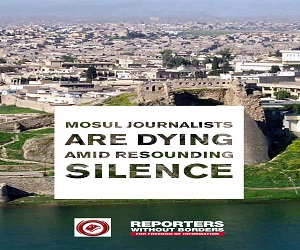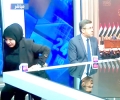JFO Baghdad - The Iraqi government is keeping an eye on local and foreign media outlets that are covering security events in the country, especially the war against the Islamic State (IS), namely in the battle to liberate the city of Mosul.
On Dec. 3, the United Nations Assistance Mission for Iraq (UNAMI) rectified its previous report on the violence against civilians in Iraq, following the criticism of the report by the Iraqi Ministry of Defense, which requested it to be amended. UNAMI admitted that the number of casualties mentioned in the report was incorrect and was not collected from reliable sources.
This was not the first time that media outlets or humanitarian organizations corrected their reports following requests by Iraqi authorities. Since the launch of the Mosul operation, the Iraqi government is keeping an eye on media outlets and humanitarian organizations covering the battle of Mosul to prevent them from publishing false reports.
On Nov. 21, the Joint Operations Command (JOC) that is affiliated with the Iraqi government expelled a reporter for the Saudi newspaper Asharq al-Awsat that published a report on “illegitimate pregnancies in southern Iraq.” The newspaper then issued an apology for the report.
Although the Saudi newspaper’s report did not address any security details concerning the battle to liberate Mosul or any other military campaign, the JOC issued an order to expel the newspaper’s reporter from all military fields, where he was working to cover the news.
In a press statement Nov. 21, the JOC said, “In light of the lies, fabrications and slurs on the values and customs of the Iraqi people published in Asharq al-Awsat, it has been decided to expel the reporter of this perverse newspaper. He is also banned from being present on all the military fronts.”
In the same vein, a reporter for the United Arab Emirates-based Sky News Arabic reported that the government security forces had detained civilians who fled Mosul and prevented them from drinking water. This caused confusion within the Iraqi security circles.
Subsequently, the government War Media Unit was swift to make a statement, demanding Sky News to issue an apology for its correspondent’s reporting. So far, there has been no response from the newspaper.
However, one day after the War Media Unit statement, reporter Hewa Aziz, who is now based in Iraqi Kurdistan, made a media appearance to correct the information he had shared after the government media unit required evidence in support of his claims, according to a Sky News source who spoke to Al-Monitor.
For his part, Saeed al-Jiashi, an official in the War Media Unit, told Al-Monitor, “The unit does not impose conditions on the media outlets covering the battles. Nevertheless, it refuses any breach of the press standards in covering the news. It does not seek praise from media outlets for any failed achievements or rebuke for events that did not exist.”
He added, “The unit is working within the press freedom standards and does not restrict the work of institutions that seek to cover the battles, but will not allow the diffusion and circulation of false information. When this happened, we excluded nine local reporters working for local Iraqi channels from battlefronts.”
The unit has an electronic network that includes a group of journalists working for local Iraqi or foreign media outlets. All information issued by the coordinator of said network — who is the media officer at the Iraqi Ministry of Interior — is considered accurate and can be published or quoted.
On Oct. 28, the Iraqi security authorities expelled Al-Arabiya al-Hadath TV's correspondent Ahmad al-Hamdani, who was covering the battle to liberate Mosul. According to the JOC, he was reporting “harmful” information.
The unit said in a press statement that “the JOC ordered the expulsion of the Al-Arabiya al-Hadath reporter from the battlefield, where he was covering the events, after disseminating false information about ar-Rutbah and Mosul.”
The reporter of the Dubai-based and Saudi-funded newspaper no longer reports from the battlefield but made a media appearance on the border of Erbil, the capital of Iraqi Kurdistan, near the border with Ninevah province.
There is a common thinking among the Iraqi security circles that the policy of Al-Arabiya al-Hadath is not commensurate with Iraq’s policy with regard to its war on terror or the political process that occurred in Iraq after 2003. This was one of the reasons behind the ongoing tension between the TV channel and the Iraqi authorities.
Moreover, an embedded Israeli journalist was present on the battlefield to cover the Mosul operation against IS, which raised much controversy in Iraq. After she entered through the Kurdistan Region with a visa that was not granted by the federal government in Iraq, the security authorities expelled her from the front line.
Today, the Iraqi government is greatly focusing on the importance of media coverage in the ongoing battle, as it believes that it is of paramount importance to unify the rhetoric of the local Iraqi media outlets, despite their different political inclinations.
This step comes after the failure of the state media over the past few years to address the rumors. Talks are making the rounds in Iraq about some Iraqi cities that have fallen under IS’ control at the media level before the military one.
For fear of losing the media battle, Iraqi authorities have established the so-called National Media Alliance, which includes a number of Iraqi media organizations, headed by the semi-official Al-Iraqiya national TV channel.
The Iraqi government has also formed a special committee under the supervision of the War Media Unit and a number of independent journalists, which has been entrusted with granting permission to embedded journalists and media outlets to cover the events in Iraq, as it deems appropriate.
By Mustafa Saadoun for the Al-Monitor






.jpg)









